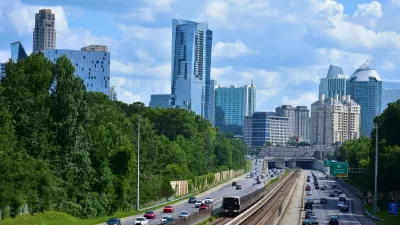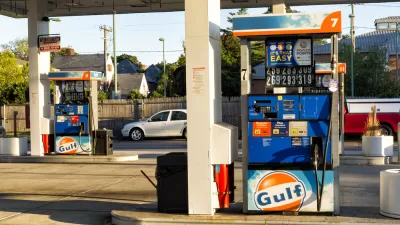The deficit commission has proposed a 15-cent gas tax, which would fund the Highway Trust Fund for needed infrastructure projects as opposed to deficit reduction. Brooking's Robert Puentes explains why it was included.
Transportation policy wonks commiserate that the federal gas tax was last raised in 1993 - creating a huge shortfall in maintenance and inability to launch new projects. The National Commission on Fiscal Responsibility and Reform (known simply as the deficit commission) addressed a consequence of this funding lapse, as Puentes explained:
"Simply put, it's because the gas tax doesn't generate enough revenue to cover the costs of the federal transportation program. So on three separate occasions since September 2008 a total of $34.5 billion in general funds have been used to backfill the transportation account to keep it from running a negative balance. And this does not even include the general fund money that regularly funds some transit and safety programs, nor the $35.9 billion in general funds for highway and transit projects as part of the American Recovery and Reinvestment Act."
As was to be expected, none of the deficit medicine was to be swallowed, as Fox News reported on Dec. 3: "The report from the 18-member deficit commission won the support of 11 members, short of the 14 necessary to be formally adopted. The vote does not preclude Congress from taking up any of the dozens of recommendations on the floor, but it virtually assures the proposals will not be considered as a single package."
Thanks to The Transit Coalition
FULL STORY: Why a Gas Tax Is About Deficit Reduction

Alabama: Trump Terminates Settlements for Black Communities Harmed By Raw Sewage
Trump deemed the landmark civil rights agreement “illegal DEI and environmental justice policy.”

Study: Maui’s Plan to Convert Vacation Rentals to Long-Term Housing Could Cause Nearly $1 Billion Economic Loss
The plan would reduce visitor accommodation by 25% resulting in 1,900 jobs lost.

Planetizen Federal Action Tracker
A weekly monitor of how Trump’s orders and actions are impacting planners and planning in America.

Waymo Gets Permission to Map SF’s Market Street
If allowed to operate on the traffic-restricted street, Waymo’s autonomous taxis would have a leg up over ride-hailing competitors — and counter the city’s efforts to grow bike and pedestrian on the thoroughfare.

Parklet Symposium Highlights the Success of Shared Spaces
Parklets got a boost during the Covid-19 pandemic, when the concept was translated to outdoor dining programs that offered restaurants a lifeline during the shutdown.

Federal Homelessness Agency Places Entire Staff on Leave
The U.S. Interagency Council on Homelessness is the only federal agency dedicated to preventing and ending homelessness.
Urban Design for Planners 1: Software Tools
This six-course series explores essential urban design concepts using open source software and equips planners with the tools they need to participate fully in the urban design process.
Planning for Universal Design
Learn the tools for implementing Universal Design in planning regulations.
Caltrans
Smith Gee Studio
Institute for Housing and Urban Development Studies (IHS)
City of Grandview
Harvard GSD Executive Education
Toledo-Lucas County Plan Commissions
Salt Lake City
NYU Wagner Graduate School of Public Service




























